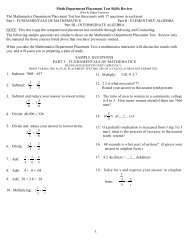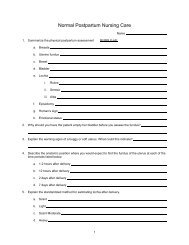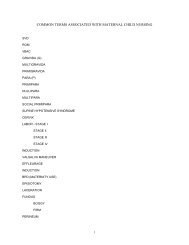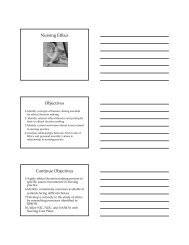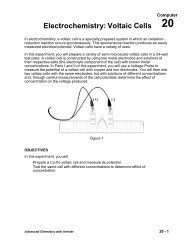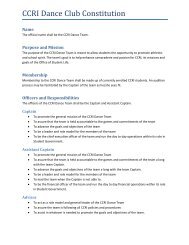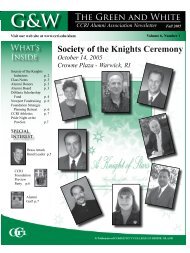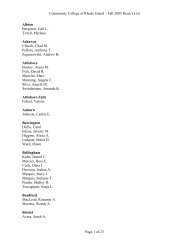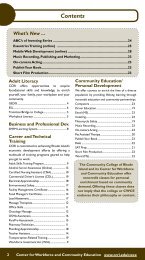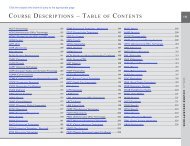Course Descriptions - Community College of Rhode Island
Course Descriptions - Community College of Rhode Island
Course Descriptions - Community College of Rhode Island
You also want an ePaper? Increase the reach of your titles
YUMPU automatically turns print PDFs into web optimized ePapers that Google loves.
A lab is also utilized to demonstrate various<br />
techniques. (Prerequisites: MATH 1200<br />
and 1210) Lecture: 2 hours, Lab: 2 hours<br />
eTek (eleCTroniCS<br />
TeChnology)<br />
ETEK 1000 - Computer Repair 1<br />
A+ Hardware - 3 Credits<br />
This course covers the installation, configuration<br />
and troubleshooting <strong>of</strong> hardware<br />
components. The material is presented to<br />
prepare the student for the A+ Core Hardware<br />
examination. This course may not be<br />
used as an elective in the Electronics or<br />
Instrumentation programs. (Recommended:<br />
COMI 1415) Lecture: 2 hours, Lab: 2 hours<br />
ETEK 1500 - Introduction to Wireless<br />
Networks - 3 Credits<br />
This course introduces wireless networking<br />
over a range <strong>of</strong> applications, from cell<br />
phones to wireless local area networks<br />
(WLAN), to broadband wide area network<br />
links and satellite. Topics covered include<br />
and overview <strong>of</strong> wireless communication<br />
technology, protocol layers, local area<br />
network (LAN) hardware, IP addressing,<br />
802.11 standards, MA (Media Access<br />
Control) standards, WLAN components,<br />
basic security, basic RF theory, antennas<br />
and troubleshooting. The student will have<br />
hands-on experience with various LAN<br />
and WLAN networking components, applications,<br />
tools and projects. (Prerequisites<br />
CSCO 1850) Lecture: 2 hours, Lab: 2 hours<br />
ETEK 2010 – Telecommunications I -<br />
4 Credits<br />
This course introduces students to today’s<br />
telecommunications environment and its<br />
underlying technology. Topics covered<br />
include analog and digital signals, modulation,<br />
transmission systems, telecommunications<br />
regulatory issues, standards bodies,<br />
voice technology fundamentals, telecommunications<br />
network traffic, transmission,<br />
facilities, network providers and services,<br />
customer premises equipment and services<br />
for voice communications, transmission<br />
carrier services, wireless telecommunications<br />
technologies and prospects for the<br />
future <strong>of</strong> telecommunications. (Prerequisites:<br />
COMI 1100 and ENGR 2320 or equivalent)<br />
Lecture: 3 hours, Lab: 3 hours<br />
ETEK 2020 - Telecommunications II -<br />
4 Credits<br />
This course teaches students how data,<br />
video, graphics, audio and images are<br />
transmitted over networks. Topics covered<br />
include modem standards, transmission and<br />
multiplexing over analog and digital networks,<br />
Time Division Multiplexing (TDM),<br />
Frequency Division Multiplexing (FDM),<br />
interface types, PSTN, Digital Subscriber<br />
Line (xDSL), cable modems, ISDN, SONET,<br />
Asynchronous Transfer Mode (ATM), T-1<br />
access, Frame Relay, Internet2 and IPng/<br />
IPv6. (Prerequisite: ETEK 2010 or equivalent)<br />
Lecture: 3 hours, Lab: 3 hours<br />
ETEK 2100 - Desktop Technician I -<br />
3 Credits<br />
In this course, students learn how to install<br />
and support users running Micros<strong>of</strong>t Windows<br />
Operating System. Topics include<br />
installing opertating systems and service<br />
packs, managing access to files and folders,<br />
configuring hardware devices and drivers,<br />
setting up network protocols, configuring<br />
security options and troubleshooting<br />
associated problems. Lecture: 2 hours, Lab:<br />
2 hours<br />
ETEK 2110 - Desktop Technician II –<br />
3 Credits<br />
In this course, students learn how to install<br />
and support desktop applications running<br />
under the Micros<strong>of</strong>t Windows operating<br />
system. Applications include the complete<br />
Office Suite, Outlook and Internet Explorer.<br />
Students learn how to set up standard and<br />
custom configurations for these applications.<br />
They also learn how to manage<br />
security issues and respond to breaches.<br />
Troubleshooting problems associated with<br />
these applications including connectivity<br />
issues are also explored. (Prerequisite: COMI<br />
1100) Lecture: 2 hours, Lab: 2 hours<br />
ETEK 2220 - Electronic Devices and<br />
Circuits II - 4 Credits<br />
This course <strong>of</strong>fers an in-depth study <strong>of</strong><br />
solid state circuits using the small signal<br />
equivalent analysis. The course also<br />
includes a study <strong>of</strong> the analysis and design<br />
<strong>of</strong> a variety <strong>of</strong> amplifier circuits and their<br />
practical applications to electronic circuits.<br />
Frequency effects, amplifier frequency<br />
response curves, negative and positive<br />
feedback, oscillator and op-amps are also<br />
studied. (Prerequisites: MATH 1710, ETEK<br />
1120 and 1060) Lecture: 3 hours, Lab: 3 hours<br />
ETEK 2280 - Electronic<br />
Communications - 3 Credits<br />
Modern electronic communications systems<br />
theory, techniques and terminology<br />
are examined in this course. Frequency<br />
spectrum, modulation schemes, and multiplexing<br />
techniques are analyzed. Topics<br />
covered include amplitude modulation, frequency<br />
modulation, wave and transmission<br />
line theory, antenna design, RADAR, television,<br />
and fiber optics. coursework includes<br />
lectures, interactive learning and laboratory<br />
exercises. (Recommended: Students<br />
are expected to have successfully completed<br />
courses in college algebra and basic DC and<br />
AC circuit analysis prior to taking this class.)<br />
Lecture: 2 hours, Lab: 2 hours<br />
ETEK 2350 - Computer Repair 2<br />
A+ S<strong>of</strong>tware - 3 Credits<br />
This course covers installation, configuration<br />
and troubleshooting <strong>of</strong> s<strong>of</strong>tware/operating<br />
system components. The material is<br />
presented to prepare the student for the<br />
A+ OS Technologies examination. Lecture: 2<br />
hours, Lab: 2 hours<br />
Prerequisite: Successful completion <strong>of</strong> course required before registering. Corequisite: <strong>Course</strong> must be taken prior to or at the same time.<br />
etek-etut<br />
eTuT (energy uTiliTy<br />
TeChnology)<br />
ETUT 1060 - Energy Industry Safety -<br />
3 Credits<br />
This course provides an introduction to the<br />
principles <strong>of</strong> safety, guidelines for the design<br />
and maintenance <strong>of</strong> energy equipment.<br />
Students learn the skills necessary for safe<br />
power generation, transmission and distribution.<br />
The course covers industry safety<br />
practices and human reactions in normal<br />
and abnormal conditions. Safe working conditions<br />
are compared to industry standards<br />
and OSHA regulations. From a safety prospective,<br />
the course provides an overview<br />
<strong>of</strong> the electric generation process, power<br />
plant systems and functions, typical power<br />
industry philosophy, departmental responsibilities<br />
and practices, industrial health<br />
issues, and environmental safety. (Prerequisites:<br />
MATH 0600, ENGL 0700 or equivalent;<br />
Corequisites: ETUT 1160, ETEE 1050) Lecture:<br />
2 hours, Lab: 2 hours<br />
ETUT 1160 - Introduction to Energy<br />
Utility Industry - 3 Credits<br />
This course provides students with an<br />
overview <strong>of</strong> the energy utility industry<br />
and its occupational opportunities. This<br />
includes the history <strong>of</strong> providing reliable<br />
energy service, regulatory influences, and<br />
electric/gas energy flow. The course also<br />
covers basic terminology, typical conditions<br />
for employment and career opportunities.<br />
Current technology for energy generation,<br />
transmission and distribution are discussed<br />
and demonstrated. This course integrates,<br />
with the required corequisite, for an overall<br />
understanding <strong>of</strong> the energy utility industry,<br />
its functions, business issues, procedures<br />
and practices. (Prerequisites: MATH 0600,<br />
ENGL 0700 or equivalent Corequisites: ETUT<br />
1060, ETEE 1050, MATH 1700) Lecture: 2<br />
hours, Lab: 2 hours<br />
171



